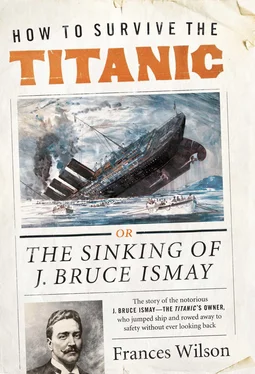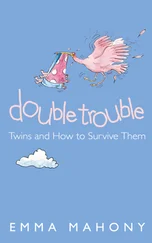The papers on the morning of Tuesday 16 April offered opinions on the wreck by experienced seamen. Admiral Dewey was quoted in the Washington Post as saying that any passenger who crossed the North Atlantic in a transatlantic vessel ‘takes his life in his hands… the greed for money-making is so great that it is with the sincerest regret that I observe that human lives are never taken into consideration’. Admiral F. E. Chadwick wrote in the New York Evening Post that the ‘ Titanic was lost by unwise navigation, by running at full speed’. The New York Times revealed what everyone in the shipping world already knew: the Titanic had been allowed, by the British Board of Trade, to go to sea with insufficient lifeboats. ‘If the Titanic had been under United States Government supervisions,’ a naval contractor wrote in the San Francisco Examiner, ‘its owners would have been compelled to equip it with forty-two lifeboats at least… The trouble with the English regulations is that they are behind the times.’ The ‘old fogeyism’ of the British had cost American lives, and ‘we Americans’, as Admiral Dewey put it, ‘surely have some rights in this matter’. The US naval historian, Rear Admiral Alfred Thayer Mahan, a relation of Marian Thayer’s dead husband, wrote in the Evening Post: ‘I hold that under the conditions, so long as there was a soul that could be saved, the obligation lay upon Mr Ismay that that one person and not he should have been on the boat.’ An editorial in New York’s Truth commented with irony: ‘I cannot help regarding it as “providential” that the chairman of the company happened to be standing where he was at the moment when the last boat — or was it the last but one? — left the ship, and there were no women or children at hand to claim the place into which he was thus enabled to jump.’
In the Senate, William Alden Smith of Michigan called for a formal inquiry to be conducted with immediate effect. His resolution was given unanimous support; he was to authorise a panel composed of an equal number of Republicans and Democrats ‘to investigate the causes leading to the wreck of the White Star liner Titanic, with its attendant loss of life so shocking to the outside world’. Senator Smith was empowered to ‘summon witnesses, send for persons and papers, to administer oaths, and to take such testimony as may be necessary to determine the responsibility therefore’. The sinking of the Titanic, said Senator Rayner of Maryland, was a crime and should be investigated in the same way as any other crime. Had the Titanic been an American ship and ‘subject to our own criminal procedure’, Ismay would be convicted of ‘manslaughter if not murder’. ‘Here you have the spectacle of the head of a line failing to see that his ship is properly equipped with life-saving apparatus, heedless of the warnings that he was sailing in dangerous seas, forsaking his vessel, and permitting 1,500 of her passengers and crew to be swallowed by the sea. Mr Ismay,’ Rayner suggested to the Senate, ‘the officer primarily responsible for the whole disaster’ has
reached his destination in safety and unharmed. Mr Ismay should be brought here and be made to explain these things. He should not be requested to come. It is not a question of his good will… and he should be asked particularly to explain how he, the directing manager of the company, the superior of the Captain, and not under the Captain’s orders, directed the northern route which ended so fatally and then left hundreds of passengers to die while he took not the last boat, but the very first boat that left the sinking ship… All civilised nations will applaud the criminal prosecution of the management of this line. If they can be made to suffer, no sympathy will go out for them.
Ismay, meanwhile, was planning his return voyage. He could not face New York: the onslaught of information, the questions, the crowds, the grief, his wife’s American family, the White Star Line executives, the insurers, the press, the publicity, the sharpening sense of the horror of it all. He would have to endure, he assumed, a rough few days — possibly even weeks — of media coverage before interest in the Titanic would fade away and he could get his life back.
Escape came in the form of another White Star liner, the Cedric, currently docked in New York and ready to sail. On disembarking from the Carpathia, Ismay and the 200 surviving Titanic crew members could immediately board the Cedric and be home within the week. As fog was delaying the Carpathia, the need to postpone the Cedrics imminent departure quickly became a fixation for Ismay. It would not be absconding to return to England straight away, he reasoned; it was simply business as usual: he was, quite rightly, picking up the rhythm of his life again and the crew would need to get themselves positions on new ships. So on Wednesday morning at 9 o’clock Ismay sent a Marconigram to Franklin reading:
Very important you should hold Cedric daylight Friday for Titanic crew. Answer, Yamsi.
Messages addressed to ‘Yamsi’ would be delivered personally to Ismay, and messages signed ‘Yamsi’ indicated that they were sent personally by Ismay himself. The name was not, Franklin later explained, ‘used by us very much over here’ — he had never himself used the name before — while it was ‘used entirely on the other side’. 32But when Ismay called himself Yamsi on the Carpathia, where he was on neither one side nor the other, it took on a different significance. Ismay backwards, Yamsi was an inversion of the man Ismay used to be. He had stepped into a looking-glass world where, as Lewis Carroll’s Alice explains when she ‘softly jumps’ from the fireplace into the drawing room on the other side of the mirror, everything is the same ‘only the things go the other way’.
The official Marconigram that Ismay had been persuaded to send Franklin on Monday morning was eventually received at 9 o’clock on Wednesday morning. No sooner had Franklin absorbed its contents than ‘Yamsi’s’ message arrived. So rather than being furnished with the ‘further particulars’ promised in the first message, Franklin was instead being told to delay the Cedric. He replied:
Accept my deepest sympathy horrible catastrophe. Will meet you aboard Carpathia after docking. Is Widener aboard?
George Widener, who had not survived, was the son of a director of the International Mercantile Marine. Franklin also forwarded a message from Ismay’s wife, Florence:
So thankful you are saved, but grieving with you over the terrible calamity. Shall sail Saturday to return with you.
Ignoring both messages, Ismay repeated to Franklin:
Most desirable Titanic crew aboard Carpathia should be sent home earliest moment possible. Suggest you hold Cedric, sailing her daylight Friday unless you see any reason contrary. Propose returning in her myself. Please send outfit of clothes, including shoes, for me to Cedric. Have nothing of my own. Please reply, Yamsi.
Franklin replied that ‘we all consider it most unwise to delay Cedric considering all circumstances’, adding that he had arranged for the crew to return home on Saturday on the Lapland. He later explained that ‘we determined it would be a very unfortunate thing to attempt to hold the Cedric and hurry the crew on board or agree to Mr. Ismay’s sailing under the present circumstances, with which Mr Ismay, as we knew, was not in any way familiar. We were here, and we were hearing the criticism. We knew what was being said, but Mr Ismay had no knowledge or information regarding that. We realised the necessity of getting the crew off, which was just what we wanted done in every other case of the kind and what every shipowner would do.’ 33
Читать дальше












